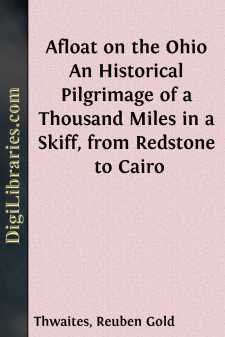Categories
- Antiques & Collectibles 13
- Architecture 36
- Art 48
- Bibles 22
- Biography & Autobiography 813
- Body, Mind & Spirit 142
- Business & Economics 28
- Children's Books 14
- Children's Fiction 11
- Computers 4
- Cooking 94
- Crafts & Hobbies 4
- Drama 346
- Education 46
- Family & Relationships 57
- Fiction 11828
- Games 19
- Gardening 17
- Health & Fitness 34
- History 1377
- House & Home 1
- Humor 147
- Juvenile Fiction 1873
- Juvenile Nonfiction 202
- Language Arts & Disciplines 88
- Law 16
- Literary Collections 686
- Literary Criticism 179
- Mathematics 13
- Medical 41
- Music 40
- Nature 179
- Non-Classifiable 1768
- Performing Arts 7
- Periodicals 1453
- Philosophy 64
- Photography 2
- Poetry 896
- Political Science 203
- Psychology 42
- Reference 154
- Religion 513
- Science 126
- Self-Help 84
- Social Science 81
- Sports & Recreation 34
- Study Aids 3
- Technology & Engineering 59
- Transportation 23
- Travel 463
- True Crime 29
Afloat on the Ohio An Historical Pilgrimage of a Thousand Miles in a Skiff, from Redstone to Cairo
Description:
Excerpt
PREFACE.
There were four of us pilgrims—my Wife, our Boy of ten and a half years, the Doctor, and I. My object in going—the others went for the outing—was to gather "local color" for work in Western history. The Ohio River was an important factor in the development of the West. I wished to know the great waterway intimately in its various phases,—to see with my own eyes what the borderers saw; in imagination, to redress the pioneer stage, and repeople it.
A motley company have here performed their parts: Savages of the mound-building age, rearing upon these banks curious earthworks for archæologists of the nineteenth century to puzzle over; Iroquois war-parties, silently swooping upon sleeping villages of the Shawanese, and in noisy glee returning to the New York lakes, laden with spoils and captives; La Salle, prince of French explorers and coureurs de bois, standing at the Falls of the Ohio, and seeking to fathom the geographical mysteries of the continent; French and English fur-traders, in bitter contention for the patronage of the red man; borderers of the rival nations, shedding each other's blood in protracted partisan wars; surveyors like Washington and Boone and the McAfees, clad in fringed hunting-shirts and leathern leggings, mapping out future states; hardy frontiersmen, fighting, hunting, or farming, as occasion demanded; George Rogers Clark, descending the river with his handful of heroic Virginians to win for the United States the great Northwest, and for himself the laurels of fame; the Marietta pilgrims, beating Revolutionary swords into Ohio plowshares; and all that succeeding tide of immigrants from our own Atlantic coast and every corner of Europe, pouring down the great valley to plant powerful commonwealths beyond the mountains. A richly-varied panorama of life passes before us as we contemplate the glowing story of the Ohio.
In making our historical pilgrimage we might more easily have "steamboated" the river,—to use a verb in local vogue; but, from the deck of a steamer, scenes take on a different aspect than when viewed from near the level of the flood; for a passenger by such a craft, the vistas of a winding stream change so rapidly that he does not realize how it seemed to the canoeist or flatboatman of old; and there are too many modern distractions about such a mode of progress. To our minds, the manner of our going should as nearly as possible be that of the pioneer himself—hence our skiff, and our nightly camp in primitive fashion.
The trip was successful, whatever the point of view. Physically, those six weeks "Afloat on the Ohio" were a model outing—at times rough, to be sure, but exhilarating, health-giving, brain-inspiring. The Log of the "Pilgrim" seeks faintly to outline our experiences, but no words can adequately describe the wooded hill-slopes which day by day girt us in; the romantic ravines which corrugate the rim of the Ohio's basin; the beautiful islands which stud the glistening tide; the great affluents which, winding down for a thousand miles, from the Blue Ridge, the Cumberland, and the Great Smoky, pour their floods into the central stream; the giant trees—sycamores, pawpaws, cork elms, catalpas, walnuts, and what not—which everywhere are in view in this woodland world; the strange and lovely flowers we saw; the curious people we met, black and white, and the varieties of dialect which caught our ear; the details of our charming gypsy life, ashore and afloat, during which we were conscious of the red blood tingling through our veins, and, alert to the whisperings of Nature, were careless of the workaday world, so far away,—simply glad to be alive....


